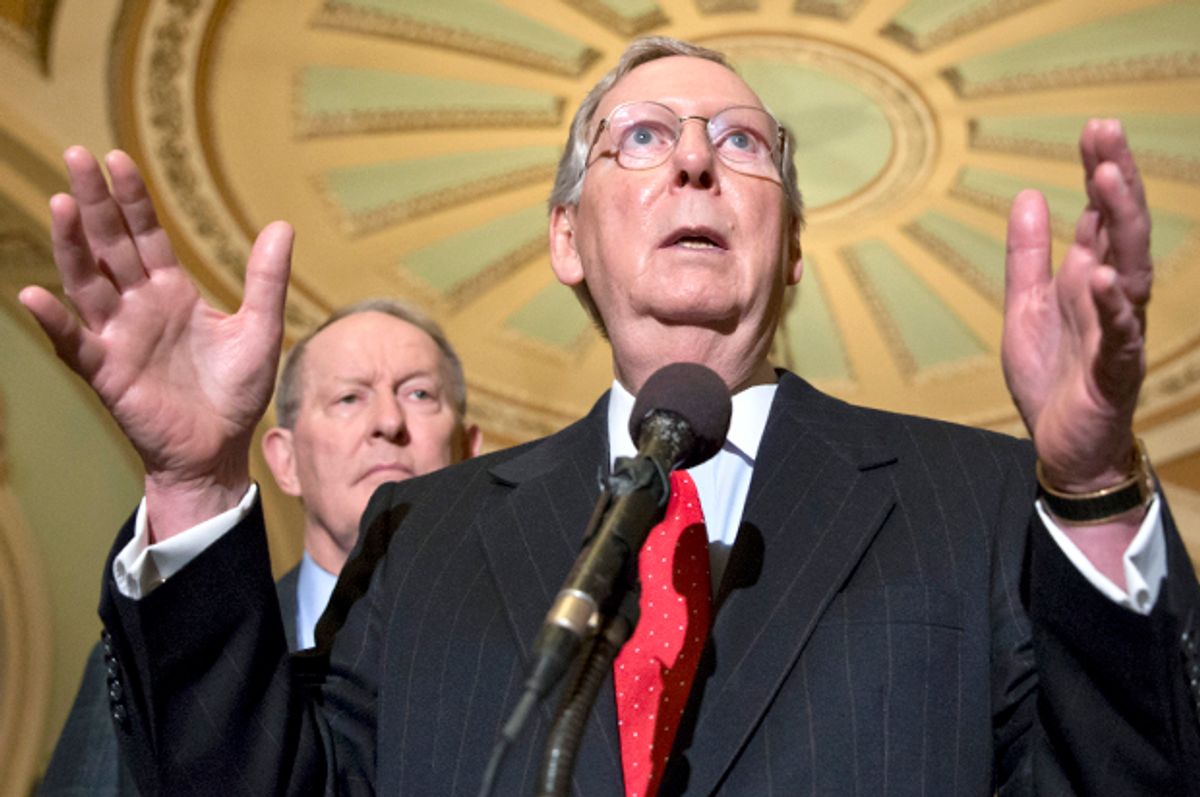Now's the point where Republican Senate control seems likely enough -- though not guaranteed! -- that would-be members of that majority are going to have to start dialing back expectations.
Sen. Mitch McConnell, who may or may not but probably will be leader of that majority, has been vocal about the presumed Republican Senate majority's desire to repeal Obamacare "root and branch." (Although Kentucky can keep its Obamacare, since it's just a "website," etc., etc.) What anyone who has a working knowledge of basic governmental process understands, though, is that Obamacare will not be repealed in the next Congress. A Republican attempt to repeal the Patient Protection and Affordable Care Act would first have to surmount a 60-vote threshold in the Senate, which it wouldn't, and then override a presidential veto with 67 votes in the Senate and whatever two-thirds of 435 is in the House, which it also wouldn't. Even in the magical outer-space fairy land where a repeal passed, Republicans would then face all sorts of other problems, like coming up with an alternative for the millions of people who lose their coverage.
Mitch McConnell is, among other things, a person with a working knowledge of basic governmental process. And here's his message for the Fox News public in these closing days of the campaign:
McConnell said repealing Obamacare remains at the top of his priority list.
“But remember who’s in the White House for two more years. Obviously he’s not going to sign a full repeal, but there are pieces of it that are extremely unpopular with the American public and that the Senate ought to have a chance to vote on,” he said.
McConnell also noted Democrats could filibuster a repeal effort.
“It would take 60 votes in the Senate. No one thinks we’re going to have 60 Republicans, and it would take a presidential signature,” McConnell said. “I’d like to put the Senate Democrats in the position of voting on the most unpopular parts of this law and see if we can put it on the president’s desk.”
OK, sure. There might be a repeal of, say, the medical device tax that makes its way to the president's desk. That would still leave thousands of other pages of evil full-communist health law on the books, though. What can you do about that? Very little.
But admitting that he won't be able to get Obamacare repealed in the next two years will be one of the easier parts of McConnell's expectation-setting. Maybe the Republican base has finally come around to accepting that. But it took years for the simple fact to set in that Republicans can't achieve any ideological goals with control of only one chamber of Congress. It took years for them to realize that taking government spending bills and debt ceiling hikes hostage were poor gambits with control of only one chamber of Congress. If Republicans get control of both the House and Senate, expectations among the base are going to jump right back to those old, naive levels, even though the basic dynamics of gridlock won't change beyond the margin.
There may be some things that a Republican Congress could place on the president's desk and pressure him into signing. A repeal of the medical device tax, construction of the Keystone XL pipeline, some other small measure of deregulation here or there. But the more ambitious ideological aims that they were not able to achieve with mere possession of the House -- an Obamacare repeal, a Paul Ryan-esque budget -- will still not be achievable with the additional possession of the Senate.
One thing we'll be sure to hear from conservatives if Republicans take control of the Senate is that McConnell has a couple of procedural options available to him, if only he has the "spine" to pursue them: invoking a "nuclear option" on legislation -- i.e., eliminating the 60-vote cloture requirement altogether -- or pursuing party goals through the budget reconciliation process, which would allow Republicans to bypass the filibuster on certain budget-related items. If our dear friend George F. Will is to be believed, McConnell would never even consider such aggressive maneuvers, since "restoring dignity to the Senate" is at all times foremost on the Kentuckian's mind. Uh-huh. We're willing to bet that if either of those moves would help McConnell in any way, then he'd pull the trigger. But they won't, because President Obama can still veto whatever comes through, and then we'll be in two-thirds majority territory. And Mitch McConnell knows this.
Mitch McConnell knows a lot of things. He knows that Republicans still won't be able to enact many significant agenda items even with control of both the House and Senate. He also knows that conservative activists nevertheless will expect him to enact many significant agenda items with control of both the House and Senate. This tension would probably resolve itself through a reliving of recent farcical history: the play-acting of brinkmanship. Things will go right down to the wire, yet again, on government funding measures and debt ceiling hikes, solely so McConnell can say "we tried everything!" and save some face, even though he knows it will all have been a waste of time. The lessons of 2011-2013 will have to be relearned.

Shares